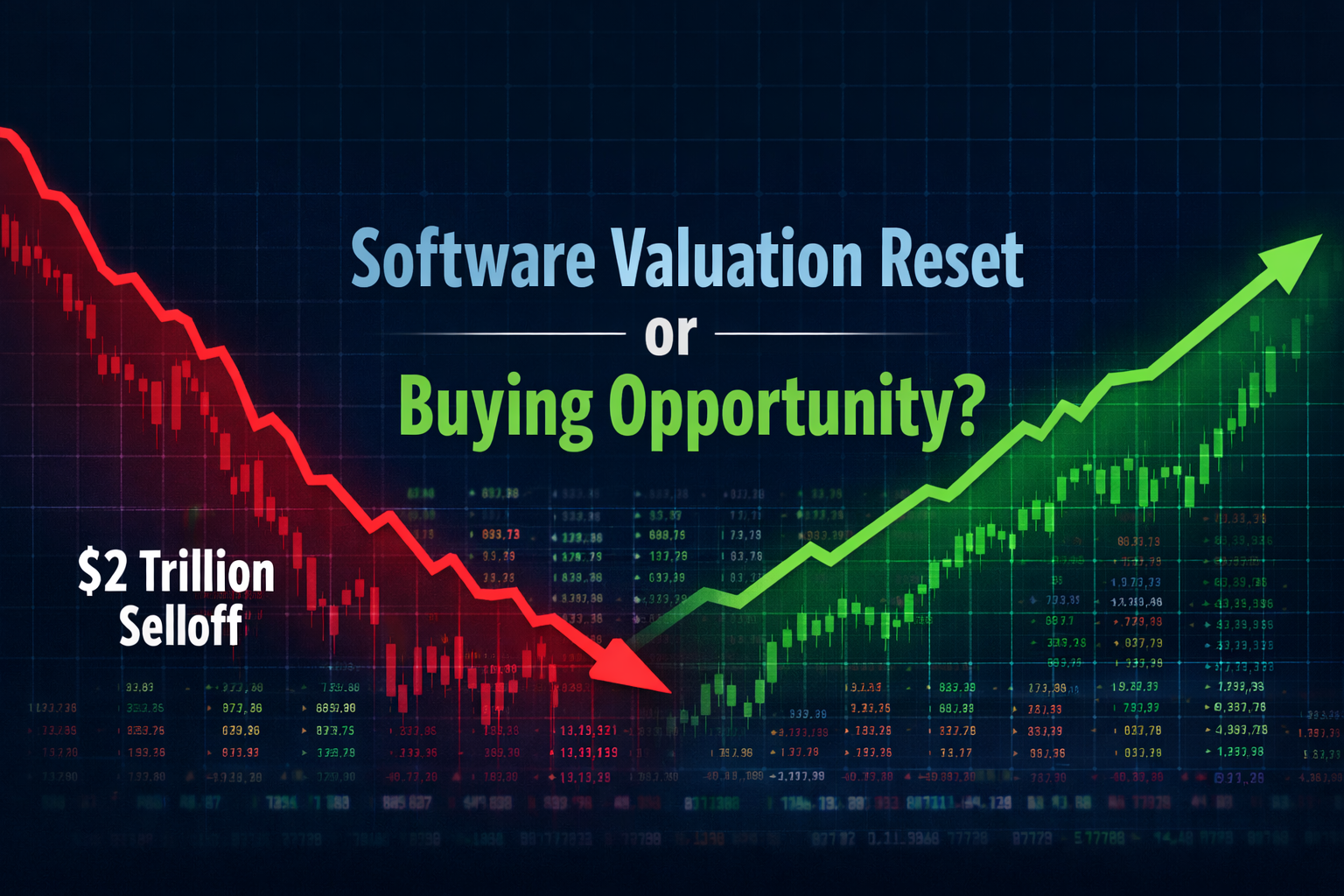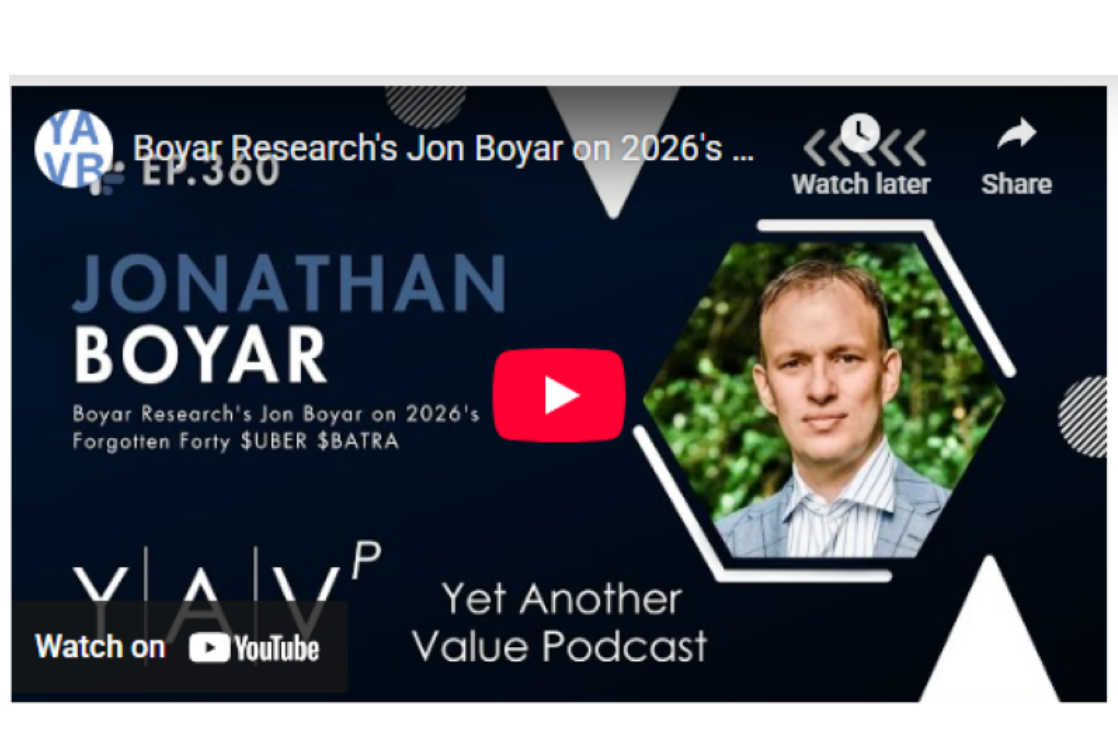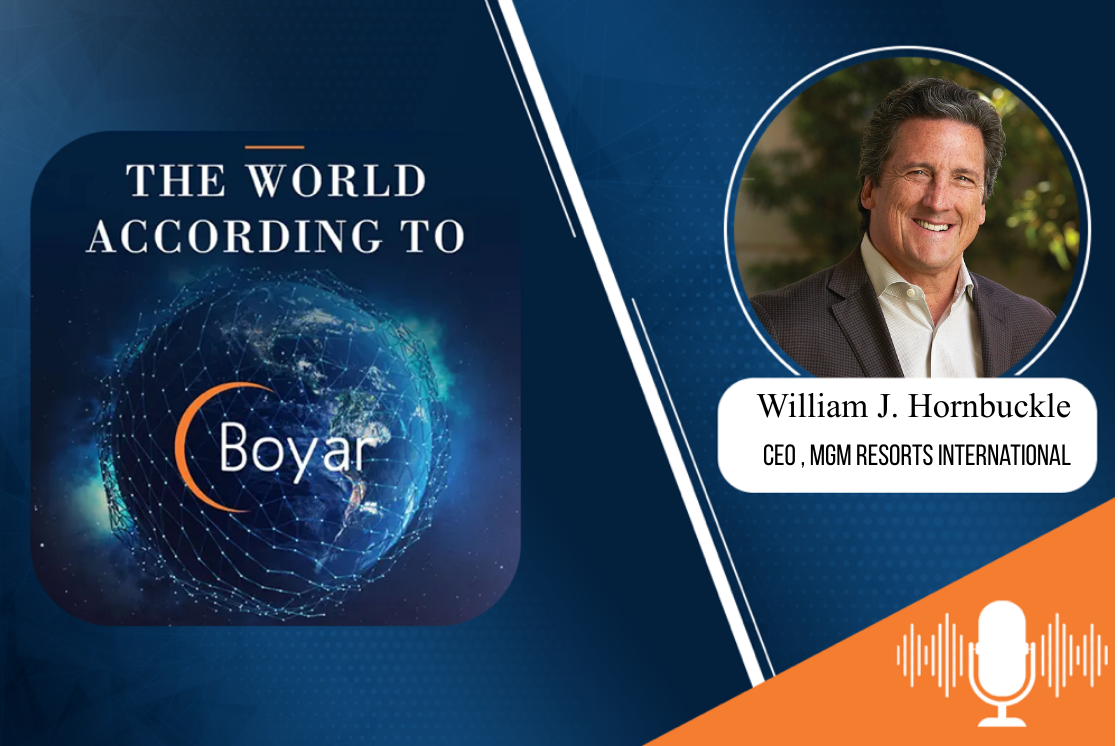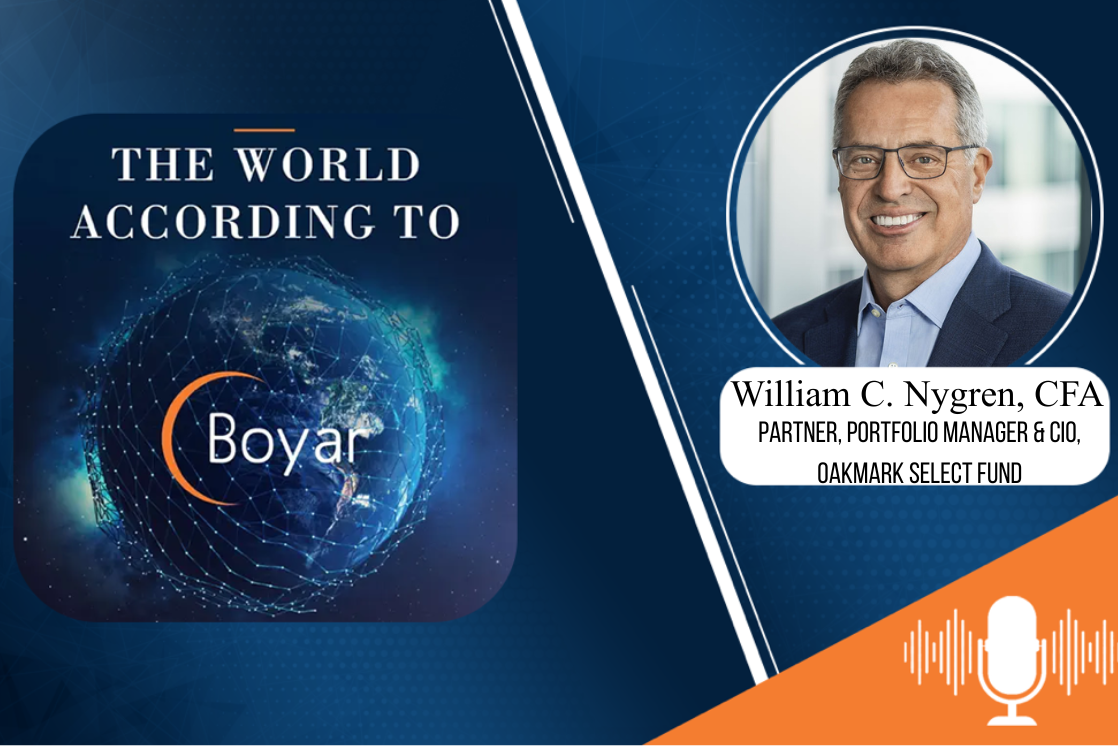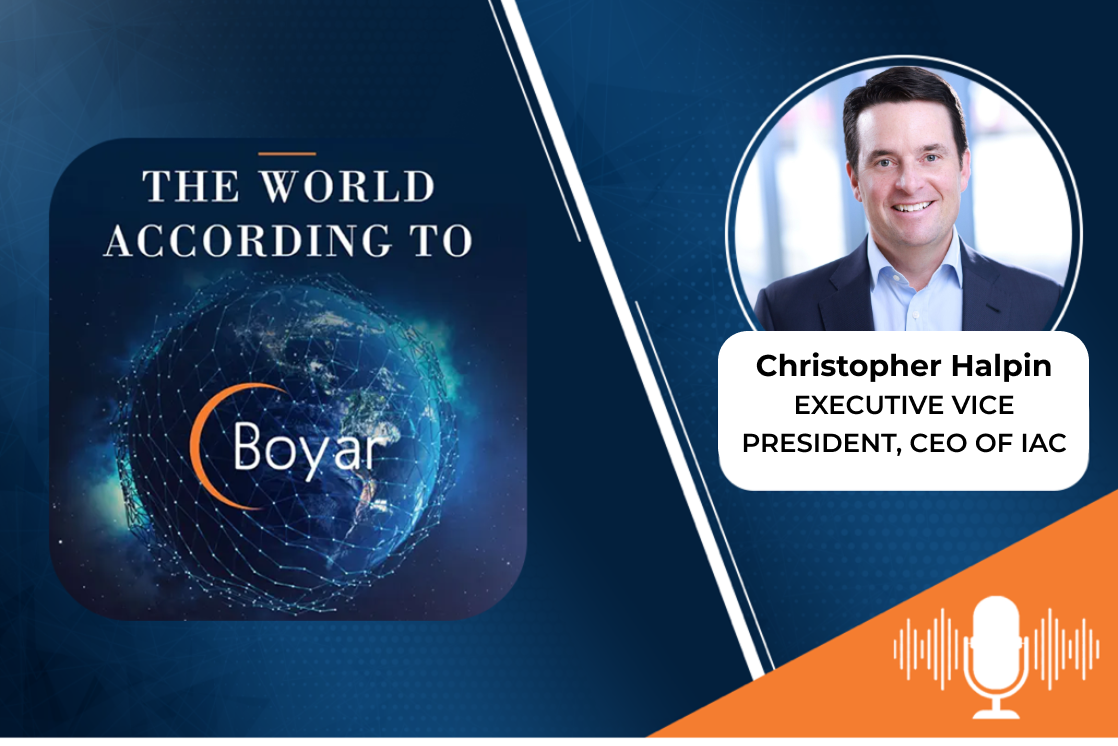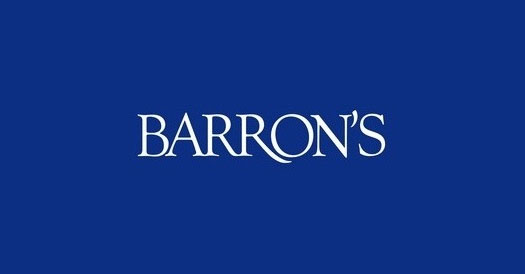William Cohan, Best selling author discusses his latest book Power Failure: The Rise and Fall of an American Icon
James Hagedorn, Scotts Miracle-Gro Chief Executive Officer and Chairman of the Board, on the tremendous opportunity in the cannabis space, potentially spinning off the fast-growing Hawthorne division and more... - Value Investing Podcast
Neil Vogel, CEO of Dotdash Meredith on how they became the largest publisher in the United States and why they can now compete with both Google/Facebook plus much more… - Value Investing Podcast
These Cool, High-Quality Stocks Are Just Right For This Overheated, Overhaled Market - Boyar Value Group
The Interview Discusses:
- The rise and fall of GE.
- What could have been done to save General Electric.
- Who is to blame for GE’s demise.
- His in-depth interviews with both Jack Welch and Jeff Immelt.
- The fundamental error that Jack Welch made that tarnished his legacy.
- How GE capital almost filed for bankruptcy during the financial crisis.
- What Disney can learn from GE’s succession issues.
- The mistake GE made by selling NBC Universal to Comcast (and one thing about the deal you probably never knew).
- His latest media venture called Puck.
- And much more…
About William D. Cohen
William D. Cohan, a former senior Wall Street M&A investment banker for 17 years at Lazard Frères & Co., Merrill Lynch and JPMorganChase, is the New York Times bestselling author of three non-fiction narratives about Wall Street: Money and Power. His new book Power Failure: The Rise and Fall of an American Icon, about the rise and fall of GE, once the world’s most powerful, valuable and important company, was published in November 2022 by Penguin Random House. He is a founding partner of Puck, a digital publication owned and operated by journalists, and a writer-at-large for Air Mail. For 13 years, he was a special correspondent at Vanity Fair.
Click Below to Read the Interview Transcript
Transcript of the Interview With William D. Cohen:
Jonathan Boyar (00:05):
Welcome to the world according to Boyar, where we bring top investors, best selling authors and business leaders to show you the smartest ways to uncover value in the stock market. I’m your host, Jonathan Boyar. As a big fan of his work. I am very excited about today’s special guest award-winning author William Cohen, who has written multiple New York Times best-selling books, including his latest, focusing on general electric power failure, the rise and fall of an American icon. Bill, welcome to the show.
William Cohan (00:39):
Great to be here, Jonathan. Thank you for having me.
Jonathan Boyar (00:41):
Thanks for coming on. As I said, I’m really excited about the show. And before we get to your latest book as well as Puck, the digital media company you co-founded, both of which I really enjoy and highly recommend. I just want to delve a bit into your background. So you started your career in journalism and then received an MBA at Columbia and had a really successful m and a banking career. Worked at some great firms like Lazar for 17 years, but then you did the transition back into journalism. How were you able to do that?
William Cohan (01:16):
Well, I think desperation and fear had a lot to do with it. I was in my young forties when JP Morgan Chase decided that my career as an investment banker was over. I needed something to do. And at that time, around 2004, there were very few opportunities in banking open for me. And so I decided, okay, 17 years is enough time to do something else. And I thought, well, what can I do that I don’t need anybody’s permission to do that. I don’t need a boss to do that. I don’t have to work for anybody else ever again to do. And I landed on the idea of, you know, essentially going back to journalism by proposing to write a book about Lazard where I had worked, albeit 10 years earlier with no thought of ever, of course going back to writing or writing a book about Lazard. So it just occurred to me that it was just this fascinating and amazing place that was private that nobody hadn’t written about in decades. And having worked there, I sort of knew it from the inside out and knew most of the people who worked there and was hoping that they would give me interviews. Anyway, so I proposed this book, I wrote a hundred page proposal and got an agent and incredibly publishers went for it. So the rest is kinda history.
Jonathan Boyar (02:49):
Not only did publishers go for it, I mean I think you won the Financial Times Book of the year. I mean that’s a, an amazing fee for your first book.
William Cohan (03:00):
That was incredibly satisfying. It was an incredible day. My wife and I flew to London. There was a ceremony at the beautiful public library and London and you know, I was one of five finalists along with Tole for Black Swan and Alan Greenspan for his book about his memoir about being fed chairman. And we did not know who had won. They decided it right before they announced it and when it was me, I couldn’t quite believe it. You know, at the Oscars they put the people who are likely to win in the front row. So there’s not a long walk between getting from the front row to the stage so they can collect their award. The ones who were unlikely to win, they put way in the back. So I was way in the back and took me like 15 minutes to get up to the front to get the award from none other than Lloyd Blankfine, the c e o of Goldman Sachs at the time, who gave me the award. It was great.
Jonathan Boyar (04:06):
That must have been just especially satisfying after your kind of your career setback to really prosper on your first go around.
William Cohan (04:16):
And then it led to my ability to get back into journalism again. I mean, I got a call from Graydon Carter after that. Did I want to write Vanity Fair? Did I want to be your columnist at New York Times? You know, well all these wonderful things started happening and that’s how I resurrected myself, as you say, after a severe career setback that I wasn’t anticipating and had done nothing to deserve. And I had two young sons. And so it went from sort of being all encompassing as a banker to being around all the time at home and trying to figure out what I was going to do next. I don’t recommend this path for anybody, but must say that if my former colleagues at JP Morgan Chase hadn’t terminated me with extreme prejudice, then I probably wouldn’t be a writer today. So I’ve often thought of dedicating one of my books to them to thank them for what they did for me.
Jonathan Boyar (05:18):
You should you know, writing these books seemed like a much better life and more rewarding than being an M&A banker. Not that there’s anything wrong with being an m and a banker.
William Cohan (05:27):
Look, I couldn’t do what I do now had I not done that for 17 years, you know, it was not something that I was passing through. It was a long time. You know, Michael Lewis, who I is a friend and have incredible respect for and don’t understand how he does what he does, he worked at Solomon I think for two years. 17 years is quite a different kind of commitment. You know, I have come away with a deep understanding of the industry, not only from having doing it as a banker, but now writing books about it or now more than as a banker. And you know, as you say, being able to do my own thing, having no boss. I don’t have to worry about colleagues scheming behind my back to get rid of me. I have my own equity, which I share with my publisher and we have a great partnership and I can do pretty much what I want on a daily basis. And you know, frankly, I don’t think there’s any better way to run your life.
Jonathan Boyar (06:28):
You wrote about the Duke Lacrosse scandal as well as, you know, other books detailing the Global Financial Crisis House of Cards, which I highly recommend. But the reason you’re here today is about your latest book on GE, which some have described and I think quite accurately in my opinion as a corporate autopsy. How did this book come about?
William Cohan (06:51):
What I do on a subliminal basis, I don’t set out to do this, but whatever reason, it does seem to work out this way that every book I’ve written, I have some sort of intersection with, you know, professionally or personally. You know, I’m not starting from scratch. You know, a lot of writers choose topics that they know nothing about and wanna find something about and do it because they’re intellectually curious. And I totally get that and I do do that. But I also find that there’s, you know, an intersection with my life, which I think gives me a little bit of a leg up like the book about Lazard, while I obviously worked there for more than six years. And so knew about the firm, you know, intimately competed against Goldman Sachs, competed against Bear Stearns, went to Duke, my book about my friends from Andover, I went to Andover ge, the same thing when I was at Columbia Journalism School, 19 82, 83 out of the blue I got asked to go on a trip for a day on GEs corporate jet to go see their lighting manufacturing plant in Cleveland and then onto Louisville to their major appliance plant.
(08:01):
And you know, it was an incredible experience to see these facilities and to be, you know, flown around on a private jet. Mine was my first time on a private jet ever. I didn’t even really know that there were private jets. So that was sort of in my mind. And then my first job at a Columbia Business School was GE Capital Financing Leverage Buyouts. So I mean, I’d been a journalist covering public schools in Wake County, North Carolina, which was fascinating. And then went to business school and then as one did you know, in the late eighties when all you had to do was breathe to get a job on Wall Street, I got this job financing leverage, which is of course absurd. So I did that for a year and then worked for the Chief credit officer at GE Capital in Stanford for a year and then, you know, moved on to Lazard, et cetera.
(08:50):
And so again, I knew about GE from having worked there, not well or anything, you know, again, I never thought I’d ever write about it. And then fast forward 30 years, one of the people that I had started with at GE Capital at my office mate, was John Flannery, who turned out, stayed at GE and rose up through the ranks incredibly, and was Jeff Al’s successor. So he and I remained friends to this day and for 30 plus years. And when he was C E O, which I thought was an incredible feather in the cap for ge, he’s an incredible guy and deserved that reward or what we thought of as a reward for his incredible performance at ge. And it turned out to be an albatross. So during the course of that, he was only there for 15 months as the ceo you know, he would occasionally share with me how difficult things were and what he was surprised about.
(09:51):
And at one point he said, well you should write a book about this. And I said, but John, I can’t write a book about this. You’re the ceo, you’re my friend so I can’t do that. So interesting suggestion but not going to happen. And then after 15 months, he was unfairly and summarily fired and was essentially what was Theta. And I thought to myself, well now I can write a book about this and frankly I need to figure out what happened here. There’s like a dead body on the floor. How did it get there? And when Jack Welch said that he would speak to me, well that kind of sealed the deal.
Jonathan Boyar (10:27):
The part about Welch speaking with you, it’s like all your books is extensively researched over 700 pages. It’s hard to tell when you’re reading on a Kindle how long it actually is, but it’s still a page turner. It really draws you in at the very beginning. You know, you have your initial meeting with Jack Welch, which I thought was fascinating. Can you tell me a little bit about it?
William Cohan (10:52):
Of course, I knew who Jack was and knew him a little bit from the island. And so I called him up and said I wanted to do this. And he agreed incredibly. And then we agreed to have our first meeting at the Anti Golf Club, which was around the corner from both of us. He wanted to have lunch. So we get there, I mean, I’m not a member there he was, and also at the nearby Sanity Golf Club. So we agreed to have lunch. And first thing out of his mouth before I can even sit down is that he feels like he totally screwed up the selection of his successor, which was quite a revelation to me. And needless to say, and I thought, wow, this is incredible. We had lunch at the next table, it turns out was Phil Nicholson who’d been playing golf that day, cuz it was a Wednesday before the Thursday tournament began in Massachusetts, the Deutsche Bank tournament.
(11:51):
And he was there with Bob Diamond, who was the former c e O of Barclays, who I knew too, who grew up on Nantucket and Paul Salem, who was one of the founders of Providence Equity Partners who grew up in the same town as I did in Massachusetts. And so I thought I was like Old home week here, this is incredible. And Phil Nicholson and Bob Diamond and Paul all came over and paid homage to Jack and like everybody would just continuously pay homage to Jack, which I totally get. And it was the beginning of a incredible time where Jack met with me six or seven times between the Tuck in and Manhattan, New York at his home in North Palm Beach. And basically completely laid out for me, you know, his personal story, his history, his career, his growing up and what it was like running GE. And then his disappointment with choosing his successor, which of course he chose, he could have chosen anyone else. He chose Jeff Alt and I think was quite disappointed with the way that worked out and was quite eager to share that with me on many, many occasions.
Jonathan Boyar (13:07):
As I said, the book was extensively researched. I, I learned a ton, not just about Jack Welter, I’d like to talk about more in a little bit, but it’s also some facts or myths about GE that I guess I just assumed were correct and they weren’t first thing, Thomas Edison was not as involved with GE as the company would like you to think. Is that correct?
William Cohan (13:32):
That’s absolutely correct. In fact, everybody seems to think that Thomas Edison was one of the founders of GE. The one day that the company under its current leadership, Larry Culp agreed to cooperate with me on this book One day only. They let me go to both Crotonville on the Hudson, which was their management training center, which was phenomenal and that they’re now selling or trying to sell. And they also let me go to their research center in NI outside of Albany, which was also phenomenal. And you go in there and the first thing you’re just assaulted by is, you know, all of the Thomas Edison paraphernalia, his desk, the stock ticker, his awards, his accomplishments, his quotations. So I just assumed like everybody else that it was his doing that created this company and his company that became GE. And actually it turned out that’s not right, which I found fascinating for obvious reasons.
(14:41):
The real story is that yes, Thomas Edison was obviously the person who helped to create the light bulb and to help create generation of electricity. So that’s all true. And he created something called Edison General Electric, which was one of the two companies that was merged together along with something called the Thompson Houston Company to form GE in 1892. But by that time, Edison General Electric was not doing particularly well. Thomas Edison was no longer the c e o of the company, his main venture capital backer. A guy named JP Morgan was not that happy with Edison and the CEO of Edison General Electric was in guy named Henry Ard, who was another venture capitalist slash railroad Barron. He was for some reason the c e o of the company at that time. And basically ARD and JV Morgan decided that they wanted to merge Edison General Electric with Thompson Houston, which was backed by a guy named Charles Coffin and his venture capital supporters in Boston.
(15:55):
And Edison was completely against it and tried to thwart it at every turn and ultimately could not, as I like to say, the money man won out. And Coffin was the new CEO Edison wanted nothing to do with it and quickly sold his shares in the company and fluked off to New Jersey to do some sort of like limestone mining project, which ultimately failed to. So is he in the DNA of the company? Sure, yes, he’s in the DNA of the company, but was he a champion of the company’s creation? Absolutely not. He tried to thwart it at every turn and was overruled by the moneymen, which again, very typical as we know. Now,
Jonathan Boyar (16:36):
Another thing that I learned that I found fascinating is, you know, one of Welch’s most lauded deals was buying company. People growing up today probably never heard of but R C A, which housed N B C. However, he was really just buying back what GE had owned years before. You know, that’s a fascinating story as well.
William Cohan (16:58):
Again, one that I had no idea about either. You know, Lazard was involved, Felix Rohatyn was involved in the acquisition of RCA by GE six point whatever, 4 billion deal in 1986. I think that was the largest m and a deal in history at that point. It was on the front page in the New York Times, you know, biggest deal ever. And obviously very exciting, GE getting into the media business by owning NBC. You know, what’s jack up to? It was sort of the embodiment of Jack’s thesis that GE needed to be either number one or number two in any industry that it was involved with. And if it wasn’t, you know, you had to get out of it or if you wanted to be, you had to buy it. So I mean this encapsulated it all. And of course RCA was another mini conglomerate with other things in it besides NBC.
(17:52):
And it turned out I had not realized, and very few other people had realized either that GE had actually started what became RCA inside GE after World War I. Because GE had developed the very exciting radio technology, the radio broadcast technology that was used during World War I by the allies to communicate to each other over secret communications cables or lines or whatever. And a scientist at GE who had developed that technology. So after the war, Woodrow Wilson, the president and Franklin Donor Roosevelt, who was the secretary of the Navy or something like that, didn’t want GE commercializing this technology and selling it. One of the biggest customers for this technology was Marconi, which was a UK company that was a competitor of GE in this radio space, which was again the hottest thing going in 1892. The hottest thing going was GEs electricity distribution and generation business in 1917, 1918.
(19:07):
The hottest thing going was GEs radio technology. And basically the US government didn’t want GE selling it to the British who were our allies during World War I. They wanted the US to control that technology and basically insisted that GE not sell the technology to Marconi and in fact encourage them to create a separate business inside GE called RCA Radio Corporation of America to own that business. And basically the government encourage GE by giving them patents and other business so that they would compensate GE for not being able to sell this technology to the British. Marconi had an American subsidiary, publicly traded American subsidiary called American Marconi, and GE bought that in like a 25 million acquisition. And RCA was off to the races then in the 1930s, again, for reasons that I’ve never really quite understood other than it was too good at what it did.
(20:22):
It forced GE to spin off RCA into its own public company and that’s when David Sarnoff became the C e O of rca. So from the 1930s to, you know, for the next 50 years, RCA was its own independent company, became a mini conglomerate that owned everything from like banquet chicken to carpet manufacturer to big television manufacturer to of course N B C, both on the television and the radio side. It was in all these crazy things, many of which my firm Lazard had helped them put together. Then Jack decided he wanted to buy it and essentially buy it back.
Jonathan Boyar (21:05):
It’s fascinating. I want to get back to that at some point because alt later sold it to Comcast for a song. But just take a quick step back. The book is called The Rise and Fall of an American Icon. And in my opinion, the title is a dramatic understatement as GE just did not rise to become the most powerful company in the world, depending on someone’s age, they wouldn’t realize how important GE was to American business. In some ways they were the Apple or the Microsoft of their day. Now they’re being the process of being broken up into a few separate companies that’s already started to occur whose total market cap is a fraction of the market cap. GE was when Jack Welch retired in 2001. Besides the obvious that nothing lasts forever, what can successful companies learn from your book to prevent what happened to GE from happening to them?
William Cohan (22:04):
If I had the real answer to that, Jonathan, I would probably be the highest paid consultant in the world. And the most sought after each situation, of course, is sui generous. I think ultimately GEs downfall occurred not because it owned GE Capital, one of the largest unregulated financial services companies in the world, which obviously suffered dramatically during the 2008 financial crisis, which again, talk about discovering something that nobody knew. Very few people realized the trouble that GE was in as a result of the 2008 financial crisis. Everybody knew what trouble the banks were in, you know, wall Street banks and the car companies and AIG. But you know, GE was as desperate as any of them and they kind of did it on the down low and got rescued very quietly. Not part of the tarp, not part of a specific rescue.
Jonathan Boyar (23:09):
They were close to filing bankruptcy, correct?
William Cohan (23:13):
GE Capital had hired Solomon and Cromwell twice to prepare the bankruptcy papers for GE Capital, which I had no idea about. And I worked at GE Capital and presumably was paying attention to these things, written two books about the 2008 financial crisis, you know, the collapse of Bear Stearns for one, and how Goldman Sachs made it through without suffering the same fate as Bear Stearns. And I didn’t know about it. So how do you avoid what happened? I think a lot of people would say, well, that Jack just planted the seeds of the destruction that occurred on Jeff ALT’s watch. I personally don’t subscribe to that theory. I think obviously Jack didn’t subscribe to that theory. And I agree with Jack. I think had Jeff listened to the warnings that he was being given regularly about the risks that were inherent in the way GE Capital was financing itself, financing itself in the short term commercial paper market, and then lending long term.
(24:18):
So the big mistake that people make in banking and always gets banks into trouble is borrowing short and lending long. Now that’s of course what fractional banking is all about. That’s what the banking system is all about. You couldn’t have banks if they couldn’t borrow short and lend long because that’s how they make their money. But you have to be constantly aware of the risks that are inherent in that model. Now look, even if you theoretically do understand how banking works and you do have a finance background, you would’ve thought Dick Fuld understood how banks worked and had a finance background, but obviously Lehman Brothers went down the tubes and you would’ve thought Jimmy Cain understood at Bear Stearns the risks in banking. So I’m not saying Jeff Immelt was unique in this, but he had been warn several times by Bill Gross, of course, the one time Bond king.
(25:21):
He had been warned repeatedly by James Grant, my hero at Grant’s interest rate observer repeatedly and even by his own treasurer about the risks that were building up in GE Capital. But Jeff, you know, is not a finance guy despite having gone to Harvard Business School, he was more of a marketing guy. He was an incredible salesman. He could probably sell ice to the Eskimos to use the pathetic cliche, but you know, he failed to really appreciate the risks that were building up at GE Capital. And then when people told him, another story that I found incredible was Michael Pralle, who was running GE Capital’s real estate business, which was incredibly successful. Basically begged Jeff to begin to sell GEs real estate business in 2007. And Jeff ignored it, ultimately fired him, was waving a McKinsey study in front of everybody’s nose saying that the real estate trees were going to grow to the sky.
(26:21):
And then of course a year later, <laugh>, the real estate market was a disaster. And Michael Pralle was right and Jeff should have listened to him. Jeff should have listened to a lot of people that he did not listen to about the risks that were in GE Capital. So my view is you’ve got to choose a ceo. It’s so basic, who really understands the business lines that the company is in. If half of your business is coming from a gargantuan, unregulated financial services business, you’d better have a pretty good idea of how financial services work. So I don’t think Jeff did, and I think Jeff got into deal heat and he either would pay too much for companies he wanted to buy, or as you were referring to NBC Universal, you know, he sort of got snookered by Comcast when he got desperate to sell something, anything. As he burned the furniture beginning in March of 2009 when he sold that to Comcast for two pieces, what ended up being around 30 billion? Well, you know, pretty much in no time n NBC Universal was worth a hundred billion obviously before the pandemic. Now it’s had some tough times, not worth that much at the moment, but certainly worth more than the 30 billion that Comcast paid for it and Jeff sold it without an auction. How do you sell something that valuable and important without an option? I don’t get it.
Jonathan Boyar (27:48):
So basically you’re pointing a little bit to se succession pointing to leadership as obviously things that are very important to companies. So for a real world example, you know Disney right now is in a business that’s undergoing major change, you know, streaming, et cetera, and Iger claims he’s not going to be there for more than a couple years. What could Disney learn from GE to help find the right successor to grow through these transitional problems?
William Cohan (28:21):
She’s somebody who is highly skilled and highly competent, who understands the business lines that you are in, right? There was reporting over the weekend from my friend Charlie Gasparino about Adam Silver, the NBA commissioner being on the shortlist to run Disney. Now, I don’t know Adam, we’re both Duke graduates. He’s got one of the greatest jobs in the world, he’s very tall.
Jonathan Boyar (28:53):
Why would he give up that job?
William Cohan (28:54):
Why would he give up that job to be CEO of Disney? A job for which he is extraordinarily unqualified. Extraordinarily unqualified. So if the Disney Board chooses Adam Silver and then Adam Silver makes the mistake of accepting the job, that is a disaster. That’s like not learning anything from the GE experience. That’s just incredibly huge mistake. I understand the headline attractiveness of potentially having Adam Silver be your c e o because that’ll bring a lot of attention to Disney and some NBA like excitement. Okay? But he doesn’t understand anything about the business. He’s never worked in the business. Negotiating television contracts with ESPN and a B C is not the same as running the movie business, running the entertainment business, running the cruise bus, all the businesses that Disney’s, again, it’d be a disaster. So I don’t know how his name gets I on a list like that, but obviously please Disney Board do not make that mistake.
(30:06):
And the problem is, you know, again, and Jeff Immelt did it and unfortunately Jamie Dimon does it, these guys hang around the hoop too long. They have a bad habit of sort of wanting to get rid of any executive who potentially threatens them either, you know, potentially as a successor or just either power play kind of way. And so, you know, the cupboard is kind of bare cupboard is kind of bare at JP Morgan for a successor. The cupboard is kind of bare at GE. Now, again, I’m so glad they chose John Flannery, but to not give him the chance and the runway to do what needed to be done was unconscionable the cover of his bear at Disney. Obviously, you know, Iger chose Chapeck and then he gets rid of him after two years. I mean it’s kind of unconscionable. So it’s really important to develop talent, to nurture talent, to not become an Imperial c e o and think that you are the only one who can do the job to recognize that IER was there for 15 years.
(31:14):
Of course Jock was there for 20 years. Immelt thought he was going to be there for 20 years. He only made it to 17. That’s just too long. Sorry, you’re not there to be the Imperial c e o. You’re there as a steward for a great corporation. That was once in G’s case, the combination of Apple and Microsoft and Google rolled up in one. It was this huge technological leader, it was a financial leader. It was the most respected company of all time at one time. It was the most valuable company of all time at one time. And you know, you are a steward of that, that’s a privilege and you’re not allowed to wreck that. And yet it gets wrecked. Joseph Schumpeter, the Austrian economist, talked about creative destruction and unfortunately it’s truly there even though you can’t see it. You know, obviously Apple has had its ups and downs, but since Steve Jobs came back the second time and Tim Cook who doesn’t nearly get the credit he deserves, he took over a company that was worth 300 billion and now it’s worth two and a half trillion. I would say that that is an incredible value creation job that he has done. But no one can imagine Apple going away at this point, but I suspect it will. Nobody would’ve expected GE to disappear, but it’s disappearing.
Jonathan Boyar (32:34):
Do you think he gets too much credit? I mean listen, you can’t argue with the numbers 12 billion when he started 12 over 650 billion. But if you put the time period, he went over the greatest bull run in US stock market history. I mean he was at 20% a year. I think GE Stock compounded the s and p I think roughly 14%. You know, I don’t know if you’ve read The Outsiders great book, he talks about eight CEOs.
William Cohan (33:06):
Yeah, I have read that book. I know him.
Jonathan Boyar (33:08):
Yeah, <laugh>, who kind of says Welch. And you know, he devotes his introduction, not really criticizing Welch just saying how much credit these other people should get. I mean, do you think part of this was just a media play?
William Cohan (33:22):
Jack had the media beating out the palm of his hand, obviously owned NBC started CNBC and MSNBC and would go on CNBC all the time. So he owned and started one of the most important financial news networks. So he had the media eating out of his hand cause he was so charismatic. And he also had the Wall Street research analysts eating out of the bottom of his hand largely because as you said, I mean every quarter he met or exceeded expectations, 80 straight quarters. And I would say that pretty much every Wall Street research analyst who covered the company covered it because they were manufacturing or industrial research analysts, not financial services research analyst. So they didn’t understand the risks that were brewing at GE Capital only Jim Grant did is more of a financial journalist than a research analyst, although it could go either way on.
(34:23):
That doesn’t work for an investor bank publishes a newsletter. So the combination of having the Wall Street research analyst eating out of the palm, his sand and the media eating out of the palm of his sand and then just outperforming every quarter. I mean that’s very potent, obviously. I mean you might have been like the meme stagger of its day, but certainly it’s valuation got out of hand. You know, people say to me all the time, oh my God, geez, valuation, can you believe it? It was 45 PE or 60 PE for an industrial business, you know, in a financial services business. That was like ridiculous alchemy. And yet, you know, look at all the people who value Tesla at ridiculous multiples. What is Tesla for some reason in Tesla, which is a car company has in various times have been worth more than all the top 10 car companies combined.
(35:13):
Now I, I don’t know if it’s still worth as much as the top 10 combined, but something like that, it’s absurd. That’s a company that’s changing the world and we should not question its valuation, but GE, which also was changing the world and was actually generating the profits now obviously in retrospect was overvalued. But you know, I think Jack was the beneficiary of a very long bull market. But you know, it’s always something Jonathan, it’s always something. I mean I listened to David Solomon the other day at the Goldman Investor Conference. You know, we’ve just been through the roughest three year period, the most volatile three year period. You know, who could have predicted? It’s always something. It’s always something. And so sometimes you have the good fortune of living through, you know, a long bull market. But it wasn’t a straight line. It was 1987, which was significantly down year and what’s been the greatest performing sector and one of the greatest performing sectors since the 2008 financial crisis financial services. Because a lot of the competition went away. And so actually it was a mistake in my mind, but obviously I wasn’t the c o for Jeff Alt to get out of GE Capital to sell GE capital because he didn’t like being a sifi. Well the financial services industry, if he stayed in it would’ve saved GE instead of getting out of it and using the proceeds to buy back stock when it was overpriced.
Jonathan Boyar (36:42):
I fully agree with that. And not to defend alt because he really destroyed value, but if you come in at 47 times earnings as the CEO and you know, GE stock fell about 30% in value over his tenure. A lot of that is just multiple compression. So I guess using just the stock price probably wouldn’t have been a fair judge of how he did.
William Cohan (37:09):
I asked Jeff, he came into the job a day before nine 11. His first day in the job was September 10th, 2001. Obviously the world changed dramatically on nine 11. I experienced it myself. Many of us did, especially on Wall Street. And it was a tough time for ge. They made the engines on the jets, they had reinsured some of the buildings on the Work financial center. They lost some employees. They owned NBC, which went without advertising for a period of time. Jeff, why didn’t you reset? Why didn’t you say to the investment community, to the Wall Street research analysts as people suggested that he do by the way reset and say, look, okay, I can write the script. I’ve just succeeded the greatest c e o of all time. This is an incredible company. But you know, as we’re going to see now post nine 11 people were too enthusiastic about the valuation of the company.
(38:09):
I wanna reset you all to what is the new reality here? It’s going to be tougher. The insurance business is tough. The jet engine business is going to be tough. The power business is going to be tough. The financial services business is going to be tough. NBC is going to be tough. Let’s just reset everybody’s expectations around what this company can do. It’s still a great company. We had an unbelievable leader and let’s just reset. So the stock would’ve gone from 40 to maybe 30 or 25. That would’ve been the best thing that would’ve happened to Jeff. But he wouldn’t do it. He didn’t wanna do it. And I kind of understand that too. That’s a very hard thing for a CEO e o to do, especially a new c e o.
Jonathan Boyar (38:48):
And Jack would’ve killed him.
William Cohan (38:49):
Jack might’ve killed him. He threatened to kill him after March of 2008, after Bear Stearns went down the tubes, when he missed the first quarter of 2008, Jack went on CN b c and said, I, I’m going to take out a gun and shoot you on national television if you missed earnings projections again. So you’re right, he might have, but you know, Jack wasn’t the CEO anymore for Jeff’s own wellbeing and the well being of the company and the expectations that he was setting for the company, he really should have done that. Now again, it’s easy to do that in retrospect, that’s the easiest thing in the world, but he should have done it.
Jonathan Boyar (39:28):
Really cognizant of your time and you know, I love the book. I just briefly want to talk about one of your other ventures puck, which I’m a big fan of. It’s an online, I guess, media company, you know, financial news and et cetera. Can you just explain a little about it, why you formed it and tell us that story?
William Cohan (39:50):
Ever since I was a newspaper reporter in Raleigh, North Carolina, as I mentioned, I never understood why publishers viewed journalists as cost centers, as a cost of the business as opposed to content creators and should be rewarded as content creators. The reason he’s able to sell ads and subscriptions is because of what we were writing, but we were treated as a cost to bear. The newspaper would have 60% EBITDA margins and part of that was because he was paying people like me, 13,000 a year. I mean it was absurd. So I always found that quite objectionable, but not that I could do anything about it. And not that it’s changed any, but along comes puck, the idea of Puck. And one of the main ideas behind it is that the journalists or the content creators, everything that I had talked about and thought about in 1982 and 1983 when I was in Raleigh.
(40:50):
So here we are nearly 40 years later and this is coming around and I was at Vanity Fair and it was started by John Kelly, my former colleague from Vanity Fair. And the idea being that I’m going to get the best journalists and writers that I can and I’m going to give them equity in this venture as well as pay them because I recognize that without them we have nothing and we have to build this business around them. And that was sort of everything that I had thought of. And that didn’t happen at Vanity Fair. That doesn’t happen at the New York Times. That doesn’t happen the Washington Post. That doesn’t happen at the New Yorker. The writers, the journalists deserve equity. We deserve to benefit from the value that we are helping to create. So that was very appealing to me and that’s why I decided to leave Vanity Fair after 13 years. Also because I didn’t really recognize the new Vanity Fair anymore after Gradon left.
Jonathan Boyar (41:50):
As part of, you know, at Puck you write a lot about the media business. I mean it’s an area that you obviously know quite well and you write about Zla and Warner Brothers Discovery and you have an interesting theory, which I do share on what’s going to happen in the media landscape or what you think would happen. And that’s NBC Universal, which you know, took go full circle back to your book, somehow combines with Warner Brothers discovery and you know, I’d just love to kind of hear your thoughts on that.
William Cohan (42:21):
I get a lot of heat for this idea or pushback. Look, I think that you have to somehow be able to see Ryan Corners and that’s Z’s job, that’s Brian Roberts job each on its own aspires to be the top competitor in the industry or the best in the industry, right? Let’s stipulate for all the problems that it’s having, that Disney is at the top of the heap, but there’s also incredibly deep pocketed competitors like Apple with its, you know, apple TV and Amazon with MGM and Prime. And then you know, down at the sort of bottom is, you know, our old friend Paramount Global, which is kind of an afterthought at this point. Even though it has some attractive assets, it’s valuation is sort of disappeared. So in the middle you have Warner Brothers discovery with incredible assets and you have n b NBCUniversal with incredible assets to be at the top tier of the competition.
(43:21):
It’s just inevitable that they’re going to have to combine. Not only are their assets relatively complimentary and I think and be hard at this moment in this regulatory regime, which is being particularly persnickety after years of doing nothing after, you know, hands off. But I think they can’t do anything anyway until the reverse Morris Trust rules are fulfilled, which is two years of being independent. So that would be April of 2024. So sometime in the run up to April, 2024. Cuz you know, these deals take a long time to close. It seems inevitable to me that Warner Brothers Discovery and N NBC Universe are going to have to get together, create some sort of joint venture, a combination where I think Brian Roberts kind of needs to have 51% ownership. So he gets 51% with Z running it as the c E O and then they become an extremely formidable competitor to Apple, Amazon, and Disney.
Jonathan Boyar (44:20):
In some ways, they become Disney in that they have theme parks, a network, and great cable assets.
William Cohan (44:28):
That’s right. They might be better than Disney. They don’t have a cruise ship, I don’t think so. Don’t have to have that headache.
Jonathan Boyar (44:35):
Well, if the NBA commissioner becomes CEO of Disney, they will be better
William Cohan (44:41):
If they make a mistake and choose my fellow dookie, Adam Silver as the NBA commissioner. That will be a big mistake. And the combination of N NBCUniversal and Warner Brothers discovery will be number one. Now, you know, it’s interesting. Both Warner Brothers discovery and Disney have about the same amount of debt at this point. Nick Dad, close to 48, 50 billion. It looks a lot better on Disney than it does on Warner Brothers discovery. And now as you mentioned, Zaz and his team recut their compensation deal so that they’re rewarded for paying down debt. They have done a good job of paying down the debt at the expense of obviously CNN. People gripe quite a bit about what’s going on over there and other people gripe about what’s going on in other parts of the business. But his main job now is to pay down this debt.
(45:30):
They have to get to investment grade. And now the CFO has promised that they will, they’ve got to do that. All bets are off until they do that. The equity is up this year. It was probably oversold last year, but to create more equity value, it’s like a publicly traded LBO at this point. They’ve got to pay down the debt and get the equity value up and then, and that’ll give him the currency to do a deal and all good things will happen at that point. Then he has more leverage with Brian Roberts, who’s obviously going to drive a hard bargain. So I applaud the W B D board for whatever they did to recut the compensation package, whose eyes has plenty of money. So I don’t worry about him, but he’s got to be rewarded for paying down that debt.
Jonathan Boyar (46:14):
One thing with that debt though, and I don’t know if it was Malone, I don’t know if it was a board, I don’t know if it was Zaslav, but they did a fantastic job in that. Most of that debt is fixed rate. Most of that debt is due past 2040. So least he has the benefit of time,
William Cohan (46:29):
Right? But don’t forget when the deal was done, the deal was done when the Fed was making money free. You know, on the other hand, you know at and t, the price of admission was taking, you know, whatever, 50 plus billion of debt, forget whether it’s fixed rate or floating, right? It’s still 50 billion of debt, you still have to pay it back. It’s a shit load of debt on a company that wasn’t generating that much ebitda and who knows what the EBITDA is. Cause they’re now going proforma adjusted EBITDA.
Jonathan Boyar (46:58):
There’s a lot of jargon,
William Cohan (47:00):
Please stop with the proforma adjusted. Just what is the real EBITDA number? Stop. Because that’s what creditors really need to know. That’s what the rating agencies really need to know. That’s how you’re going to establish credibility in the credit markets, and that’s what it’s all about right now.
Jonathan Boyar (47:17):
Well, bill, I really want to thank you for your time. I love talking about your book Power Failure, which I highly recommend people check out. And I’d also recommend people take a look. If you’re interested in media finance, take a look at Puck. You know, it’s a site I personally subscribe to. I get a lot of really valuable information there. And just thanks for appearing on the world according to Boyar.
William Cohan (47:41):
Thank you hiring me, Jonathan. It was great.
Jonathan Boyar (47:44):
I hope you enjoyed the show. To be sure you never miss another world according to Boyar episode, please follow us on Twitter at Boyar value. Until next time.
Tags: DisneyGeneral ElectricNBC Universal
Important Disclosures. The information herein is provided by Boyar’s Intrinsic Value Research LLC (“Boyar Research”) and: (a) is for general, informational purposes only; (b) is not tailored to the specific investment needs of any specific person or entity; and (c) should not be construed as investment advice. Boyar Research does not offer investment advisory services and is not an investment adviser registered with the U.S. Securities and Exchange Commission (“SEC”) or any other regulatory body. Any opinions expressed herein represent current opinions of Boyar Research only, and no representation is made with respect to the accuracy, completeness or timeliness of the information herein. Boyar Research assumes no obligation to update or revise such information. In addition, certain information herein has been provided by and/or is based on third party sources, and, although Boyar Research believes this information to be reliable, Boyar Research has not independently verified such information and is not responsible for third-party errors. You should not assume that any investment discussed herein will be profitable or that any investment decisions in the future will be profitable. Investing in securities involves risk, including the possible loss of principal. Important Information: Past performance does not guarantee future results.
Never miss another podcast click here to subscribe today!
Available wherever you download podcasts:
About The Boyar Family Of Companies
Boyar Asset Management
We have been managing money since 1983 utilizing our proprietary in-house value-oriented equity strategies. We manage money for high net worth individuals and institutions via separately managed accounts. To find out how we can help you with your money management needs please click here
Boyar Research
Since 1975 we have been producing independent research on intrinsically undervalued companies across the market capitalization spectrum and in a wide variety of industries using a business person’s approach to stock market investing. To find out how we can help you with your research needs please click here
James Hagedorn, Scotts Miracle-Gro Chief Executive Officer and Chairman of the Board, on the tremendous opportunity in the cannabis space, potentially spinning off the fast-growing Hawthorne division and more... - Value Investing Podcast
Neil Vogel, CEO of Dotdash Meredith on how they became the largest publisher in the United States and why they can now compete with both Google/Facebook plus much more… - Value Investing Podcast
These Cool, High-Quality Stocks Are Just Right For This Overheated, Overhaled Market - Boyar Value Group



